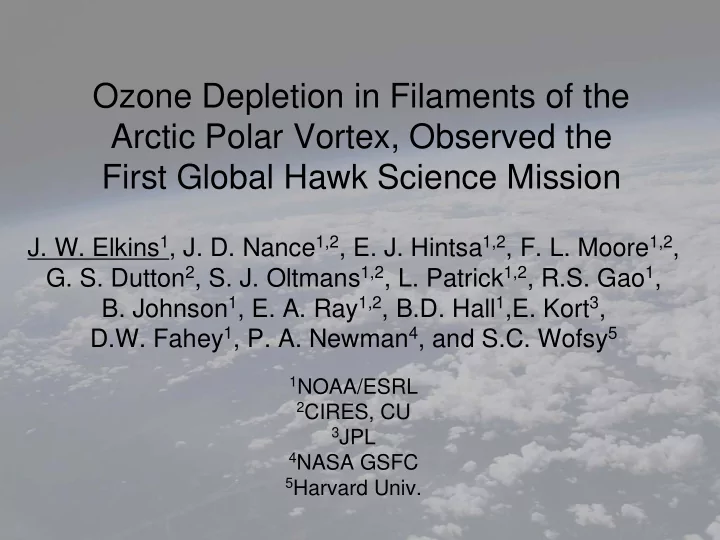

Ozone Depletion in Filaments of the Arctic Polar Vortex, Observed the First Global Hawk Science Mission J. W. Elkins 1 , J. D. Nance 1,2 , E. J. Hintsa 1,2 , F. L. Moore 1,2 , G. S. Dutton 2 , S. J. Oltmans 1,2 , L. Patrick 1,2 , R.S. Gao 1 , B. Johnson 1 , E. A. Ray 1,2 , B.D. Hall 1 ,E. Kort 3 , D.W. Fahey 1 , P. A. Newman 4 , and S.C. Wofsy 5 1 NOAA/ESRL 2 CIRES, CU 3 JPL 4 NASA GSFC 5 Harvard Univ.
How can we measure polar O 3 loss? When it is not obvious as below? Unmanned Aircraft Systems (UAS), like Global Hawk, bridge the gap between ground based and satellite measurements. GMD data, courtesy Bryan Johnson
Fast O 3 QCLS UCATS Classical O 3 PANTHER &O 3 GV GH GV GH GV How good are our UAS measurements? Comparisons of Unmanned Global Hawk data vs 1. Manned NCAR HIAPER (Gulfstream-V). 2. MLS instrument on AURA satellite. Global Hawk (GH) HIAPER or GV
Ozone loss observed on 7 May
0.5 - 0.7 ppm 13
CLaMS Model Simulation for 7 April 2010 (450K ~ 17 km) Courtesy of Jens-Uwe Grooss, Forschungszentrum Juelich
CLaMS Accumulated Ozone Loss since 1 Dec 2009
Conclusions • Overflight of the Global Hawk over the GV during HIPPO/3 produced similar tracer-tracer relationships with structure. • There was a good agreement of common tracers from different instruments on two aircraft and one satellite instrument. • Breakup of the polar vortex with low ozone during HIPPO/3 and GloPac was observed in filaments. • Agreement of ozone loss between ozone loss and model simulation.
Extras
7 April 2010
12 March 2010
Recommend
More recommend